1. Overview
Gebhard Leberecht von Blücher, later elevated to Prince of Wahlstatt, was a distinguished Prussian Field Marshal who achieved his most significant recognition by leading his army against Napoleon I at the decisive Battle of Leipzig in 1813 and the pivotal Battle of Waterloo in 1815. Known for his fiery and aggressive temperament, he earned the nickname Marschall Vorwärts (Marshal Forward) from his soldiers, a testament to his relentless drive and determination in warfare. His military career spanned over five decades, beginning in the Swedish Army before he was captured and subsequently joined the Prussian forces. Blücher's unwavering commitment to defeating Napoleon and his ability to rally his troops, even after severe setbacks, made him a leading figure in the German struggle to end foreign domination. Along with Paul von Hindenburg, he holds the distinction of being the only Prussian-German military officer to have been awarded the Star of the Grand Cross of the Iron Cross, signifying his immense historical impact on Prussian and German military tradition.
2. Early Life
Gebhard Leberecht von Blücher's early life laid the foundation for his long and impactful military career, marked by both early promise and disciplinary challenges.
2.1. Birth and Family Background
Blücher was born on 21 December 1742, in Rostock, a Baltic port located in northern Germany, which was then part of the Duchy of Mecklenburg-Schwerin. His father, Christian Friedrich von Blücher (1696-1761), was a retired army captain. The Blücher family belonged to the nobility and had been landowners in northern Germany since at least the 13th century. His mother was Dorothea Maria von Zülow (1702-1769), who also hailed from an old noble family from Mecklenburg.
2.2. Early Military Service
Blücher began his military career at the age of 16, joining the Swedish Army as a hussar. At this time, Sweden was engaged in the Seven Years' War against Prussia. In 1760, during the Pomeranian Campaign, Blücher participated in the conflict, where he was captured by Prussian hussars in a skirmish. Impressed by the young hussar, the colonel of the Prussian regiment, Wilhelm Sebastian von Belling, who was a distant relative, convinced Blücher to join his own regiment.
2.3. Seven Years' War and Prussian Service
After joining the Prussian Army, Blücher continued to participate in the later battles of the Seven Years' War. As a hussar officer, he gained considerable experience in light cavalry operations. However, during peacetime, his ardent and often unruly spirit led him into various excesses. Notably, he was involved in the mock execution of a priest suspected of supporting Polish uprisings in 1772. This incident resulted in him being passed over for promotion to major. In 1773, Blücher submitted a rude letter of resignation, to which Frederick the Great famously replied, "Captain Blücher can take himself to the devil."
Following his forced resignation, Blücher turned to farming. Over the next 15 years, he successfully acquired financial independence and became a Freemason. During Frederick the Great's lifetime, Blücher was unable to return to military service. However, after the monarch's death in 1786, Blücher was reinstated the following year as a major in his old regiment, the Red Hussars. He participated in the expedition to the Netherlands in 1787 and was promoted to lieutenant colonel in 1788. In 1789, he received Prussia's highest military order, the Pour le Mérite. By 1794, he had become colonel of the Red Hussars.
2.4. French Revolutionary Wars
Blücher distinguished himself significantly in cavalry actions against the French during the French Revolutionary Wars in 1793 and 1794. For his notable victory at Kirrweiler on 28 May 1794, he was promoted to major general. After the Treaty of Basel in 1795, which established peace between France and Prussia, Blücher returned to Prussia. In 1801, he was further promoted to lieutenant general, gaining an increasingly influential position within the Prussian military establishment.
3. Napoleonic Wars
Blücher's most celebrated period of service came during the Napoleonic Wars, where his relentless energy and aggressive leadership played a crucial role in the eventual defeat of Napoleon.
3.1. War of the Fourth Coalition (1806)
Blücher was a prominent leader of the war party in Prussia in 1805 and served as a cavalry general in the disastrous campaign of 1806 against Napoleon. At the double Battle of Jena-Auerstedt, he fought at Auerstedt, repeatedly leading charges of the Prussian cavalry, though without success. During the retreat of the shattered Prussian armies, he commanded the rearguard, composed of Frederick Louis, Prince of Hohenlohe's corps. After the main body of the Prussian army capitulated following the Battle of Prenzlau on 28 October, Blücher found his march towards the northeast blocked. He led the remnant of his corps northwest, reinforcing his numbers with a division previously commanded by Karl August, Grand Duke of Saxe-Weimar-Eisenach. With his new chief of staff, Gerhard von Scharnhorst, Blücher reorganized his forces into two small corps totaling 21,000 men and 44 cannons.
Despite their efforts, Blücher's forces were defeated by two French corps at the Battle of Lübeck on 6 November. The following day, trapped against the Danish frontier by 40,000 French troops, he was compelled to surrender with fewer than 10,000 soldiers at Ratekau. Blücher famously insisted that clauses be included in the capitulation document stating that he had surrendered due to a lack of provisions and ammunition, and that his soldiers should be honored by a French formation along the street. He was permitted to keep his sabre and move freely, bound only by his word of honor. He was soon exchanged for the future French Marshal Claude Victor-Perrin, Duc de Belluno, and remained actively employed in Pomerania, Berlin, and Königsberg until the war's conclusion. During this period, Blücher developed a strong animosity towards French Marshal Bernadotte, who had pursued his forces, an antagonism that persisted even after Bernadotte became Crown Prince of Sweden and joined the Coalition against France.
After the war, Blücher was seen as a natural leader of the Patriot Party, maintaining close contact with them during the period of Napoleonic dominance. His hopes for an alliance with Austria in the 1809 war were, however, disappointed. In that year, he was promoted to general of cavalry. In 1812, his outspoken criticism of Prussia's alliance with France led to his recall from his military governorship of Pomerania and virtual banishment from the court.
3.2. War of the Sixth Coalition (1813)
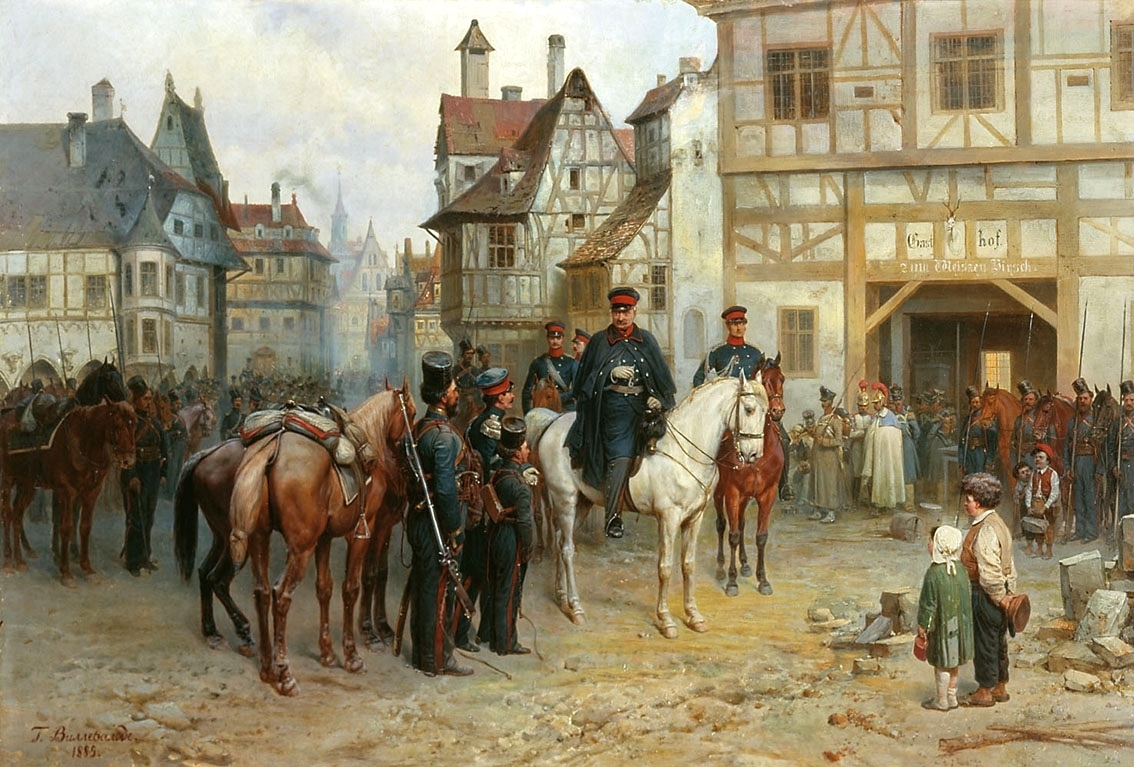
Following the start of the War of Liberation in the spring of 1813, Blücher, at the age of 71, was once again placed in high command. He became a leading hero for the Germans in their struggle to end foreign domination. He was appointed full general over the Prussian field forces and was present at the Battles of Lützen and Bautzen.
3.2.1. Battles of Lützen and Bautzen
In the early campaigns of 1813, Blücher's forces suffered significant losses at Lützen and Bautzen, leading to a temporary truce. During this period, Gerhard von Scharnhorst, who had been wounded at Lützen, succumbed to his injuries. His death led to the appointment of August von Gneisenau as Blücher's new chief of staff, a partnership that would prove crucial in the later stages of the war.
3.2.2. Battle of Katzbach
During the summer truce of 1813, Blücher focused on reorganizing the Prussian forces. When the war resumed, he became commander-in-chief of the Army of Silesia, commanding 40,000 Prussians and 50,000 Russians, with Gneisenau and Karl von Müffling as his principal staff officers. Blücher's most conspicuous military quality was his unrelenting energy, which often compelled other generals to follow his lead amidst the usual indecision and conflicting interests within the Sixth Coalition armies. He achieved a critical victory over Marshal MacDonald at the Battle of Katzbach on 26 August.
3.2.3. Battle of Leipzig
Blücher's victory over Marshal Marmont at Möckern on 16 October paved the way for the decisive defeat of Napoleon at the Battle of the Nations at Leipzig. Blücher's own army stormed Leipzig on the evening of the final day of the battle, marking his first victory against Napoleon in their four direct engagements. For his crucial role in this triumph, Blücher was made a field marshal on the day of Möckern and later received the title of Prince of Wahlstatt. He was also awarded the Star of the Grand Cross of the Iron Cross, an honor he shares only with Paul von Hindenburg in Prussian-German military history. Following the victory, he pursued the French with his characteristic energy.
3.3. Campaign of 1814
In the winter of 1813-1814, Blücher, along with his chief staff officers, was instrumental in persuading the Coalition sovereigns to carry the war directly into France.
3.3.1. Battles in France
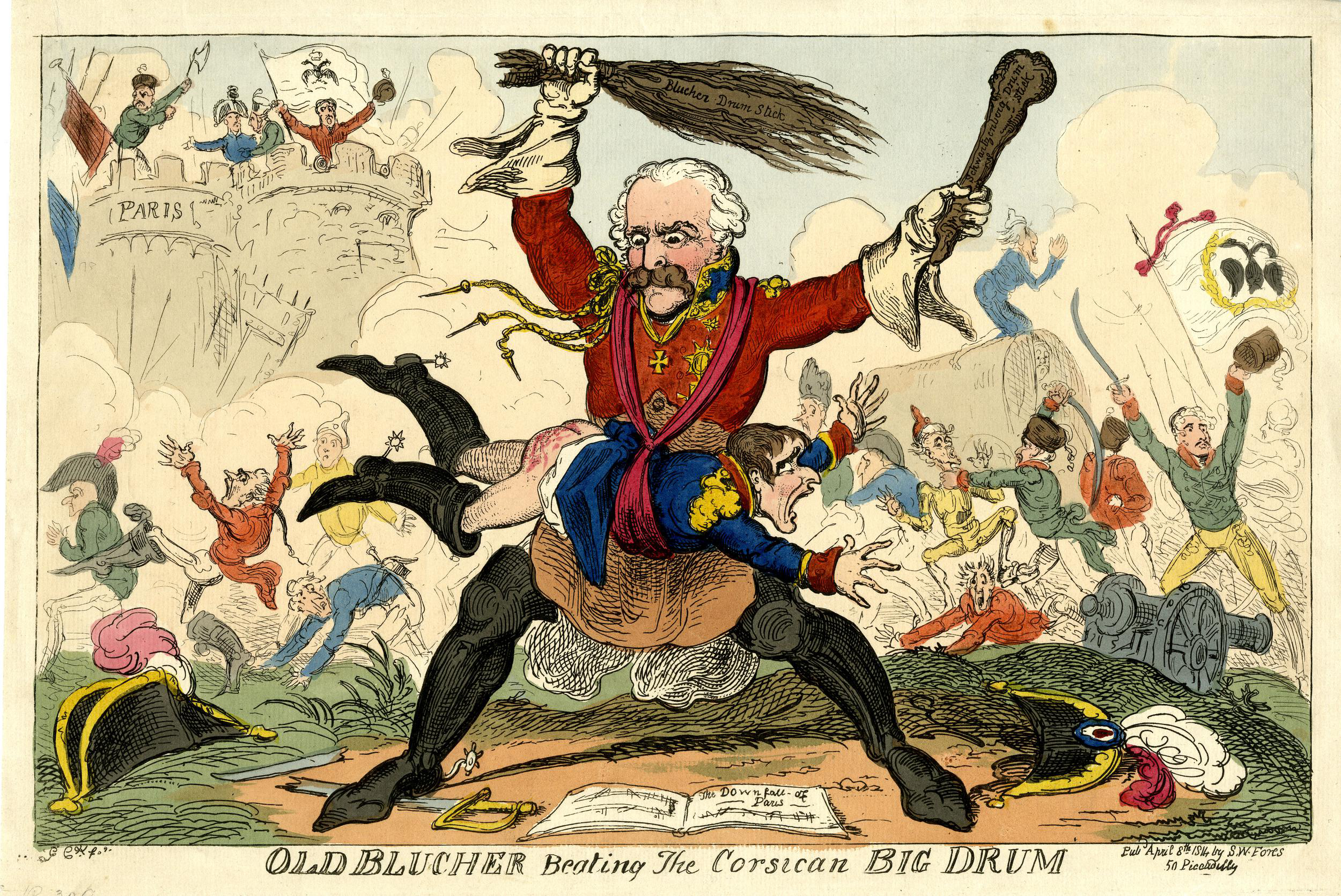
The Battle of Brienne and the Battle of La Rothière were key engagements in the early stage of the celebrated 1814 campaign in north-east France. These were quickly followed by Napoleon's victories over Blücher at Champaubert, Vauchamps, and Montmirail. Despite these setbacks, the Prussian leader's courage remained undiminished. His victory against the vastly outnumbered French at Laon (9 and 10 March) practically decided the fate of the campaign. However, the intense strains of the preceding two months severely affected his health, leading to a breakdown during which he temporarily lost his sight and suffered from a delusion. Dominic Lieven noted that this breakdown "revealed the fragility of the coalition armies' command structure and just how much the Army of Silesia had depended on Blücher's drive, courage, and charisma.... The result was that for more than a week after the battle of Laon, the Army of Silesia... played no useful role in the war."
3.3.2. Entry into Paris
After his recovery, Blücher infused some of his characteristic energy into the operations of Prince Schwarzenberg's Army of Bohemia. Eventually, this army and the Army of Silesia marched together directly towards Paris. The victory of Montmartre, the subsequent entry of the allies into the French capital, and the overthrow of the First Empire were direct consequences of this combined effort.
Blücher advocated for severely punishing the city of Paris for the suffering inflicted upon Prussia by the French armies, but the allied commanders intervened. According to the Duke of Wellington, one of Blücher's plans involved blowing up the Jena Bridge near the Champ de Mars. Wellington recounted that there were two parties in the Prussian Army regarding blowing up the bridge of Jena: Gneisenau and Müffling were against it, but Blücher was vehemently for it. Despite all efforts to dissuade him, Blücher did make the attempt, even while Wellington's sentinel was standing at one end of the bridge. However, the Prussians lacked experience in demolishing bridges. Wellington noted that while British forces, who had blown up many bridges in Spain, could have done it in five minutes, the Prussians made a hole in one of the pillars, but their powder blew out instead of up, injuring some of their own men.
In gratitude for his victories in 1814, King Frederick William III of Prussia created Blücher Prince (Fürst) of Wahlstatt, a life peerage named after the Wahlstatt monastery near Legnickie Pole, the site of the decisive Battle of Legnica in 1241. The king also awarded him estates near Krieblowitz (now Krobielowice, Poland) in Lower Silesia and a grand mansion at 2, Pariser Platz in Berlin (which later became the Embassy of the United States, Berlin in 1930). Soon afterward, Blücher paid a visit to England, where he was received with royal honors and enthusiastically cheered everywhere he went. When Oxford University granted him an honorary doctorate (doctor of laws), he is said to have joked that if he was made a doctor, they should at least make Gneisenau an apothecary, quipping, "...for if I wrote the prescription, he made the pills."
3.4. Hundred Days and Waterloo Campaign (1815)
After the 1814 campaign, Blücher retired to Silesia. However, Napoleon's return from Elba and his entry into Paris at the start of the Hundred Days called Blücher back to service. He was placed in command of the Army of the Lower Rhine, with Gneisenau once again serving as his chief of staff.
3.4.1. Battle of Ligny
At the outset of the Waterloo Campaign of 1815, the Prussians suffered a serious defeat at Ligny on 16 June. During the battle, the elderly field marshal lay trapped under his dead horse for several hours and was repeatedly ridden over by cavalry. His life was saved only by the devotion of his aide-de-camp Count Nostitz, who threw a greatcoat over his commander to obscure Blücher's rank and identity from the passing French. As Blücher was unable to resume command for some hours, Gneisenau took charge, skillfully drawing off the defeated army and rallying it. Despite Gneisenau's distrust of Wellington, he obeyed Blücher's last orders to direct the army's retreat towards Wavre, rather than Liège, thereby preserving the possibility of joining the Prussian and Wellington's Anglo-allied armies.
3.4.2. Battle of Waterloo
After treating his wounds with a liniment of rhubarb and garlic and fortifying himself with a generous dose of schnapps, Blücher rejoined his army. Although Gneisenau initially favored a withdrawal due to fears that the British had reneged on their agreements, Blücher convinced him to send two corps to join Wellington at Waterloo. He then led his army on a tortuous march along muddy paths, arriving on the field of Waterloo in the late afternoon. Despite his age, the pain from his wounds, and the immense effort required to remain on horseback, several soldiers attested to Blücher's high spirits and his unwavering determination to defeat Napoleon. Bernard Cornwell quotes him as saying, "Forwards! I hear you say it's impossible, but it has to be done! I have given my promise to Wellington, and you surely don't want me to break it? Push yourselves, my children, and we'll have victory!"
With the battle hanging in the balance, Blücher's army intervened with decisive and crushing effect. His vanguard drew off Napoleon's badly needed reserves, and his main body was instrumental in crushing French resistance. This intervention led to a decisive Allied victory, followed by the relentless pursuit of the French by the Prussians. The two Coalition armies entered Paris on 7 July. Blücher had proposed naming the battle "La Belle Alliance" (meaning "The Beautiful Alliance" in French), after the inn where Napoleon's headquarters were located, but Wellington insisted on "Waterloo," the village where his own headquarters were situated.
4. Military Assessment and Tactics
Blücher's military career was characterized by a distinctive leadership style and strategic approach that left a lasting impact on Prussian military thought.
4.1. Character and Personality
Blücher was renowned for his fiery personality and aggressive approach to warfare, earning him the nickname Marschall Vorwärts ("Marshal Forward") from his soldiers. He was often described as rough, reckless, and uncultured, yet he possessed a broad-mindedness and charisma that garnered immense popularity and loyalty among his troops. He was known for his courage, which was unparalleled, though it sometimes led him to act impulsively and lose his composure on the battlefield, resulting in tactical defeats. Despite these flaws, his indomitable spirit and refusal to accept defeat were his defining characteristics.
4.2. Military Strategy and Impact
Napoleon I himself characterized Blücher as a very brave soldier who lacked talent as a general, yet he admired Blücher's attitude, likening him to a bull that surveys its surroundings with rolling eyes and charges when it perceives danger. Napoleon considered him stubborn and untiring, knowing no fear, and called him an "old rascal" who always managed to recover and be ready for the next battle, often returning vigorously to attack even after a sound defeat.
Among the Prussian military, it was later said that Blücher established "a Prussian way of war" that had a lasting influence. The key to this way of war was Blücher's concept of victory. Like Napoleon, he placed tremendous emphasis on the decisive battle and achieving a decisive victory as quickly as possible at any cost. Also like Napoleon, he measured victory and defeat solely in terms of battlefield results. Deviating very little from the Corsican's art of war, the objective of Blücher's Prussian way of war was to engage the enemy as quickly as possible, concentrate all forces, deliver the decisive blow, and bring the war to an end.
4.3. Contemporary and Historical Evaluations
More generally, Blücher was a courageous and popular general who "had much to be proud of: energy, controlled aggression and a commitment to defeating the enemy army." While he often failed to achieve direct victories against Napoleon in head-to-head confrontations, his relentless pursuit and ability to regroup after defeats were crucial. He was a fervent patriot who tirelessly exhorted and inspired the defeated Prussian soldiers, ultimately leading them to the overthrow of Napoleon. The title "Marshal Forward" aptly encapsulates his distinguishing characteristic, for better or worse.
5. Personal Life
Blücher's personal life was marked by his marriages and the establishment of a lasting family lineage that continued to hold significant properties.
5.1. Family and Descendants
Blücher was married twice. His first marriage was in 1773 to Karoline Amalie von Mehling (1756-1791). After her death, he married Katharine Amalie von Colomb (1772-1850) in 1795, who was the sister of General Peter von Colomb. This second marriage produced no children. From his first marriage, Blücher had seven children, though only two sons and one daughter survived infancy:
- Franz Ferdinand Joachim** (1778-1829): He became a major general in the Prussian army. After being wounded in battle in 1813, he suffered from mental illness. He married Bernhardine von Sass and had issue.
- Friedrich Gebhardt Lebrecht** (1780-1834): He married Elisabeth von Conring but had no issue.
- Bernhardine Friederike** (1786-1870): She married twice, first to Adolf Ernst, Count von der Schulenburg, and secondly to Maximilian Asche, Count von der Asseburg. She had issue from both marriages.
The marshal's grandson, Count Gebhard Bernhard von Blücher (1799-1875), was created Prince Blücher of Wahlstatt (with the style of Serene Highness) in the Kingdom of Prussia on 18 October 1861. This was a hereditary title in primogeniture, with other members of his branch bearing the title of count or countess. In 1832, he purchased Raduň Castle in the Opava District (now in the Czech Republic). In 1847, he acquired the lands at Wahlstatt, Legnickie Pole. These properties remained in the family until the flight and expulsion of Germans from Poland and Czechoslovakia in 1945, which forced the family into exile. They initially moved to their mansion Havilland Hall in Guernsey, which had been acquired by the 4th prince and his English wife, Evelyn, Princess Blücher. The family later relocated to Eurasburg, Bavaria. The current head of the House of Blücher von Wahlstatt is Nicolaus, the 8th Prince Blücher of Wahlstatt (born 1932), and his son, hereditary count Lukas (born 1956), is the heir apparent.
5.2. Ancestry
| 1. Gebhard Leberecht von Blücher, Fürst von Wahlstatt | |
|---|---|
| 2. Christian Friedrich von Blücher | |
| 3. Dorothea Maria von Zülow | |
| 4. Siegfried Ulrich von Blücher | |
| 5. Ida Margarete von Winterfeld | |
| 6. Barthold Hans von Zülow, Herr auf Pätrow und Toitenwinkel | |
| 7. Dorothea Maria von Both | |
| 8. Ulrich Hans von Blücher | |
| 9. Anna Sophia von Dechow | |
| 10. Franz Henning von Winterfeld, Herr auf Kirch-Mulsow | |
| 11. Adelheid von Moltke | |
| 12. Hans Joachim von Zülow, Herr auf Zülow | |
| 13. Ida von Rantzau | |
| 14. Balthasar Valentin von Both | |
| 15. Katharina Dorothea von Lützow | |
| 16. Bernhard von Blücher, Herr auf Groß-Renzow | |
| 17. Diliane von Barner | |
| 18. Siegfried von Dechow, Herr auf Pantelitz | |
| 19. Catharina von Rieben | |
| 20. Joachim von Winterfeld, Herr auf Tüze Mulsow etc. | |
| 21. Margarethe von Passow | |
| 22. Joachim Christoph von Moltke, Herr auf Samow Schorsow und Bülow | |
| 23. Adelheid von der Lühe | |
| 24. Barthold von Zülow | |
| 25. Margaretha von Sperling | |
| 26. Paul von Rantzau, Herr zu Bothkamp Doberstorf | |
| 27. Ida von Rantzau | |
| 28. Daniel von Both, Herr auf Kalkhorst | |
| 29. Adelheid von Lützow | |
| 30. Barthold Hinrich von Lützow, Herr auf Dreilützow | |
| 31. Dorothea Maria von Bülow |
6. Honours and Decorations
Gebhard Leberecht von Blücher received numerous military orders, medals, and honorary titles from various states, reflecting his distinguished service and significant contributions to the Coalition victories against Napoleon.
6.1. Prussian Honours
From the Kingdom of Prussia, Blücher received the following notable awards:
- Pour le Mérite, awarded on 4 June 1789.
- Knight of the Black Eagle, received in April 1807.
- Knight of the Red Eagle.
- Iron Cross, 1st Class. He was awarded the Grand Cross of the Iron Cross in 1813, and the Star of the Grand Cross of the Iron Cross in 1815, an exceptionally rare decoration.
6.2. Foreign Honours
Blücher was also recognized by other European monarchies and states:
- Austrian Empire: Grand Cross of the Military Order of Maria Theresa, 1813.
- Denmark: Knight of the Elephant, 4 July 1815.
- Kingdom of Hanover: Grand Cross of the Royal Guelphic Order, 1816.
- Electorate of Hesse: Grand Cross of the Golden Lion, 11 December 1815.
- Netherlands: Grand Cross of the Military William Order, 8 July 1815.
- Kingdom of Spain: Grand Cross of the Order of Charles III, 3 July 1811.
- Sweden: Knight of the Seraphim, 28 April 1814.
- United Kingdom of Great Britain and Ireland: Honorary Grand Cross of the Order of the Bath (military), 18 August 1815.
- Württemberg: Grand Cross of the Military Merit Order, 1814.
- Russian Empire:
- Knight of St. George, 1st Class, 8 October 1813.
- Knight of St. Andrew, 11 October 1813.
- Knight of St. Alexander Nevsky, 11 October 1813.
- Knight of St. Anna, 1st Class.
- Sword of Honour "for Bravery".
7. Publications
Blücher's own writings provide insights into his military experiences and perspectives.
His campaign journal covering the years 1793 to 1794 was published in 1796:
- Kampagne-Journal der Jahre 1793 und 1794 (Berlin: Decker, 1796)
A second edition of this diary, along with some of Blücher's letters, was published in 1914:
- Vorwärts! Ein Husaren-Tagebuch und Feldzugsbriefe von Gebhardt Leberecht von Blücher, introduced by General Field Marshal Colmar Freiherr von der Goltz, edited by Heinrich Conrad (Munich: G. Müller, 1914)
His collected writings and letters (together with those of Yorck and Gneisenau) appeared in 1932:
- Gesammelte Schriften und Briefe / Blücher, Yorck, Gneisenau, compiled and edited by Edmund Th. Kauer (Berlin-Schöneberg: Oestergaard, 1932)
8. Death and Burial
Blücher's final years were spent in retirement, and his death marked the end of an era for Prussian military leadership.
8.1. Final Years and Death
After the Napoleonic Wars, Blücher remained in the French capital for a few months before his age and infirmities compelled him to retire to his Silesian residence at Krieblowitz. At the invitation of the British government, he made another state visit to England, where he was formally thanked for his army's contributions and his crucial role in the Waterloo Campaign. Upon his carriage stopping on Blackheath Hill, overlooking London, he is famously said to have exclaimed, "What a city to sack!" He died at Krieblowitz on 12 September 1819, at the age of 76.
8.2. Mausoleum and Remains
Following his death, an imposing mausoleum was constructed to house his remains in Krieblowitz. However, the mausoleum and Blücher's remains faced a grim fate during World War II. When Krieblowitz was conquered by the Red Army in 1945, Soviet soldiers reportedly broke into the Blücher mausoleum, scattered his remains, and allegedly used his skull as a football. After 1989, some of his remains were recovered by a Polish priest and subsequently interred in the catacomb of the church in Sośnica (German: Schosnitz), located 1.9 mile (3 km) from the now Polish Krobielowice.
9. Legacy
Blücher's legacy extends beyond his military achievements, influencing German culture, public memory, and even the naming of various entities.
9.1. Monuments and Memorials
After Blücher's death, numerous statues and monuments were erected in his memory across Germany. Statues honoring him stand in Berlin, Breslau (now Wrocław, Poland), Rostock, and Kaub (commemorating his troops' crossing of the Rhine in pursuit of Napoleon's forces in 1813). The Rhineland town of Kaub also hosts a museum dedicated to Blücher, specifically commemorating his historic crossing of the Rhine with the Prussian and Russian armies on New Year's night 1813-1814. Blücher is further honored with a bust in the Walhalla temple near Regensburg.
9.2. Namesakes
Blücher's name has been adopted for various entities, reflecting his enduring fame:
- Locomotives:** In gratitude for his service, George Stephenson, the pioneering British locomotive engineer, named one of his early locomotives "Blucher." A small mining village a few miles from Stephenson's birthplace in Wylam also bears the name "Blucher" in his honor.
- Ships:**
- The 1814 ship Blucher was named after him, following its capture by the British and subsequent renaming by its new owners.
- Three ships of the German navy have been named in honor of Blücher. The first was the corvette SMS Blücher, built at Kiel's Norddeutsche Schiffbau AG (later renamed the Krupp-Germaniawerft) and launched on 20 March 1877. After a boiler explosion in 1907, she was taken out of service and ended her days as a coal freighter in Vigo, Spain.
- On 11 April 1908, the Panzerkreuzer SMS Blücher was launched from the Imperial Shipyard in Kiel. This ship was sunk on 24 January 1915 during the First World War at the Battle of Dogger Bank.
- The Second World War German heavy cruiser Blücher was completed in September 1939 and declared ready for service on 5 April 1940 after sea trials and training exercises. The vessel was tragically sunk four days later near Oslo during the invasion of Norway.
- Other:**
- A boarding house at Wellington College, Berkshire is named "The Blucher," known as a boys' house excelling in sports and academics.
- The surname of Vasily Blyukher, a prominent Soviet military commander, was reportedly given to his family by a landlord in honor of Gebhard von Blücher.
- Near Twickenham Stadium in London, there is a pub named "The Prince Blucher."
- The Blucher shoe, an external lacing shoe, is named after him, as he is credited with inventing an easy-to-wear shoe that fit various foot shapes, which was widely adopted by armies across Europe.
9.3. Properties and Residences
Several properties were historically associated with Gebhard Leberecht von Blücher and his descendants:
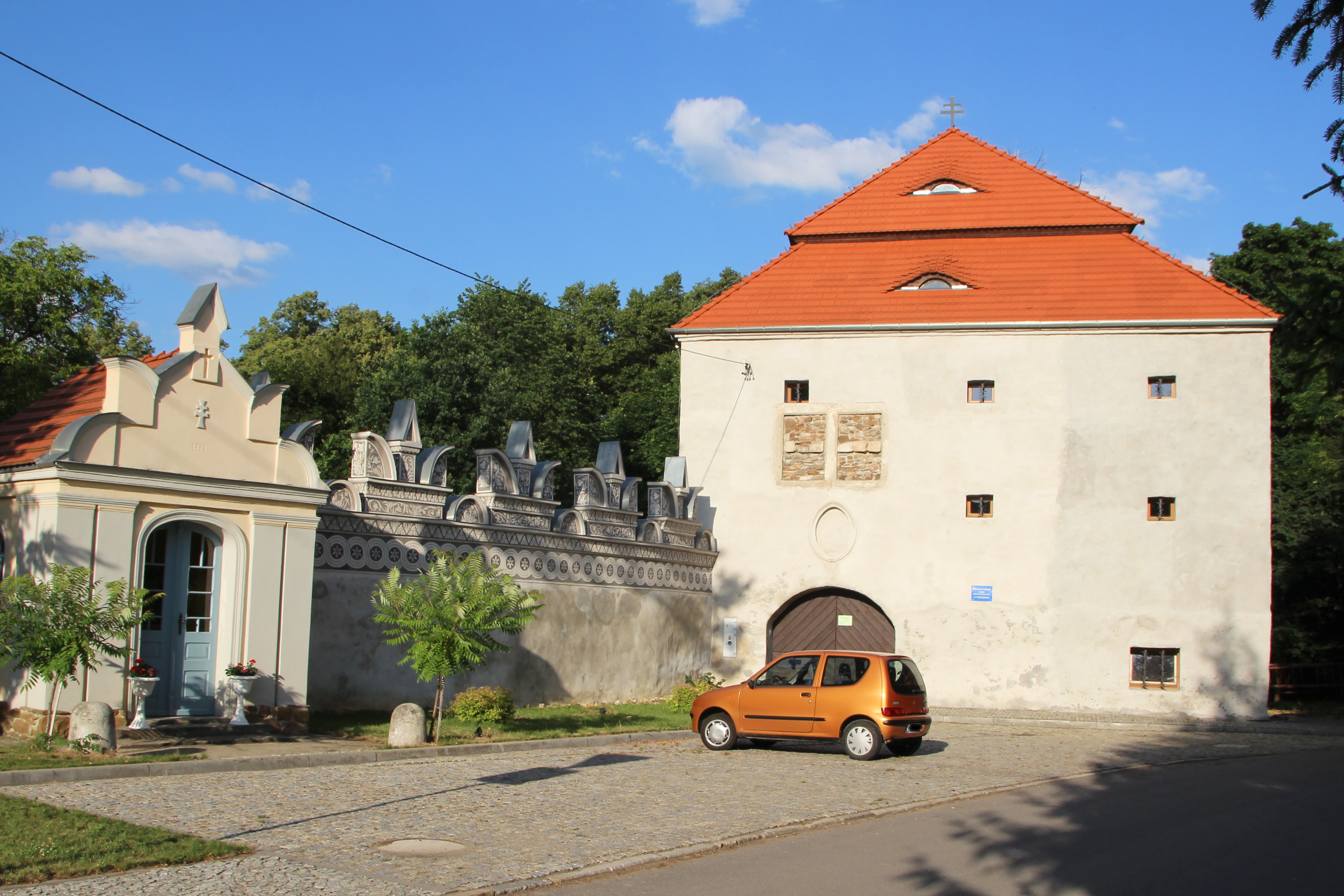
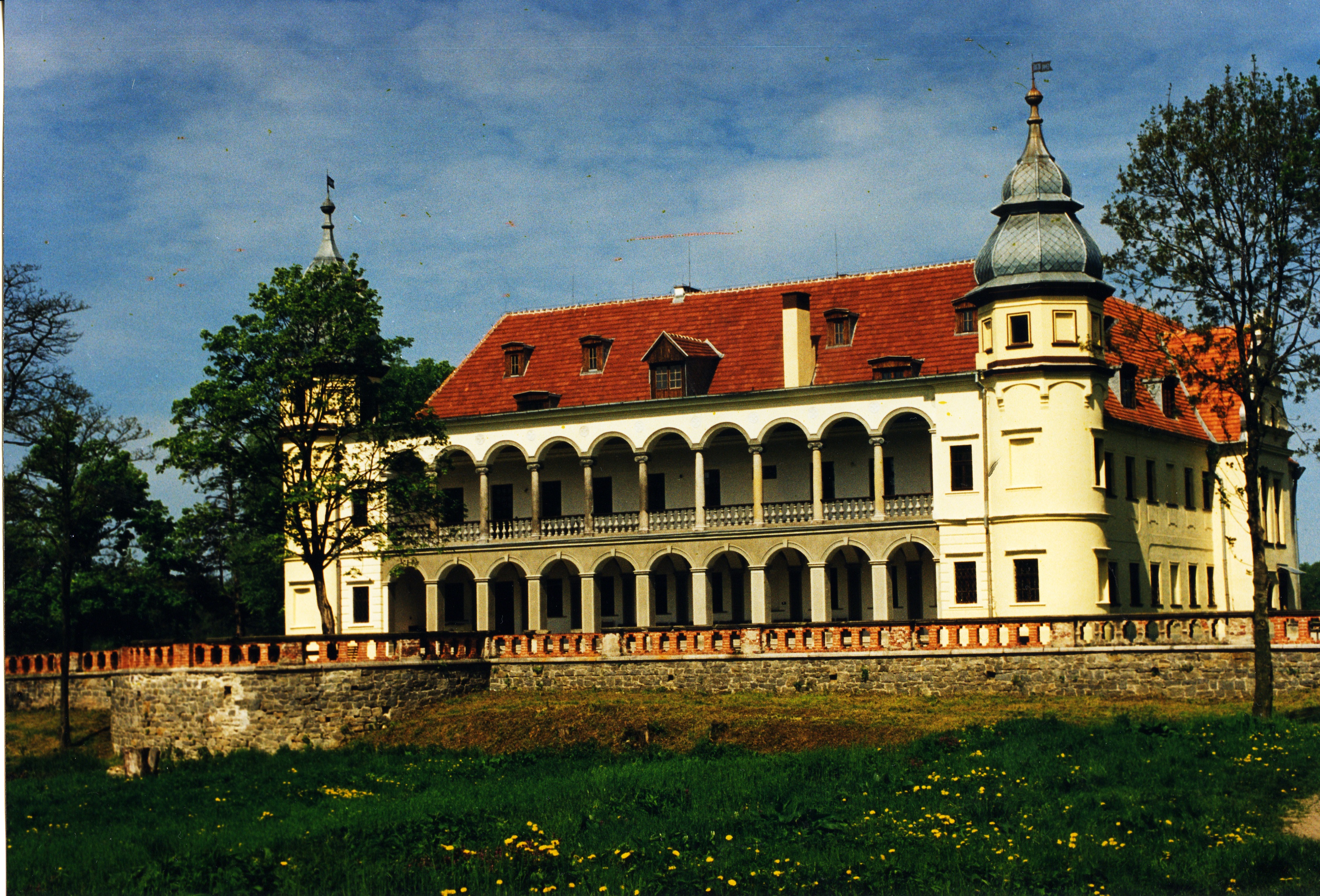
The Blücher family held several significant properties across Central Europe. For instance, the castle in Trzebina (Kunzendorf), near Prudnik, was owned by the family from 1812 to 1817. Krobielowice (Krieblowitz) Castle in Lower Silesia was a family possession from 1814 until 1945.
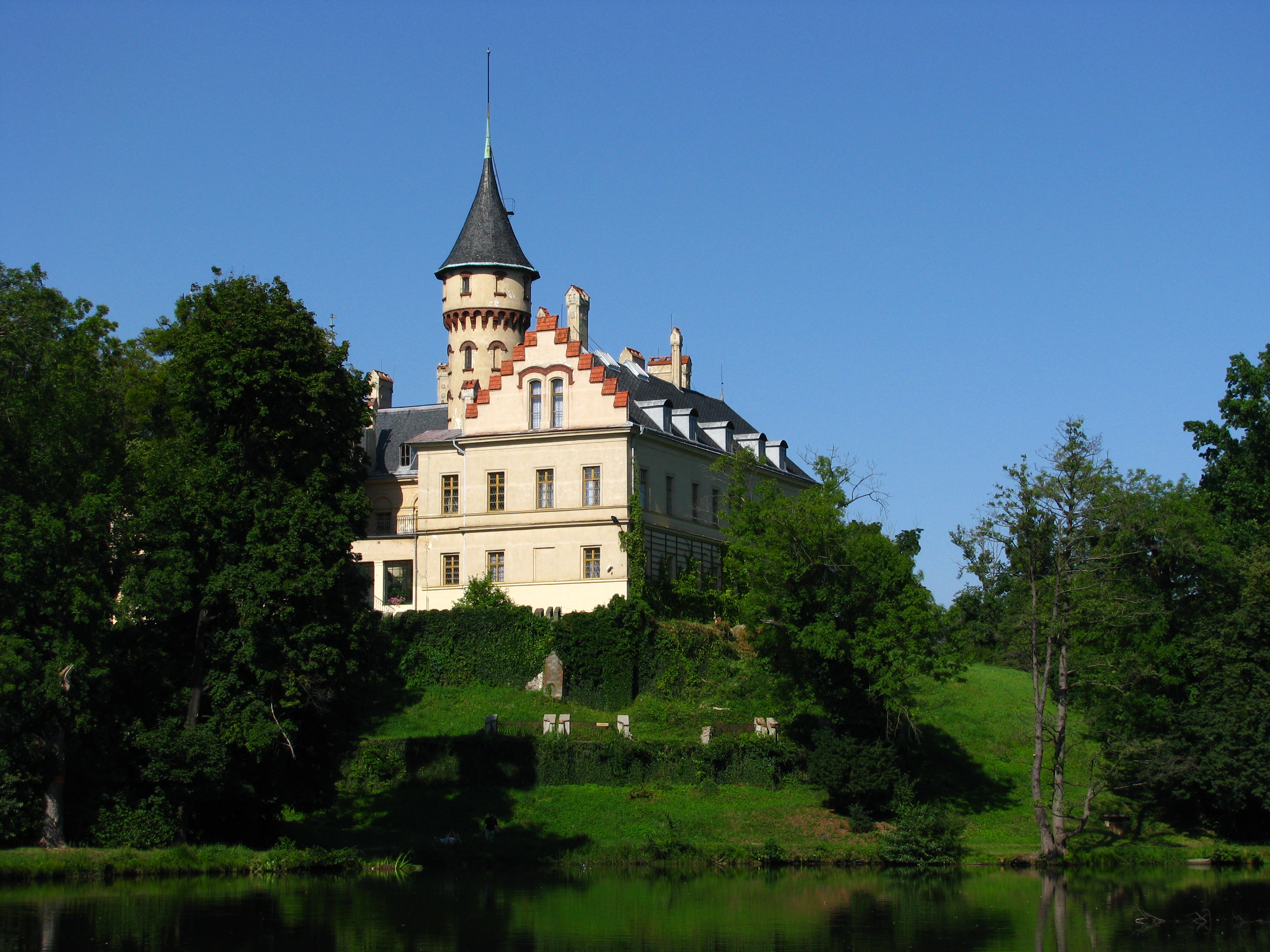
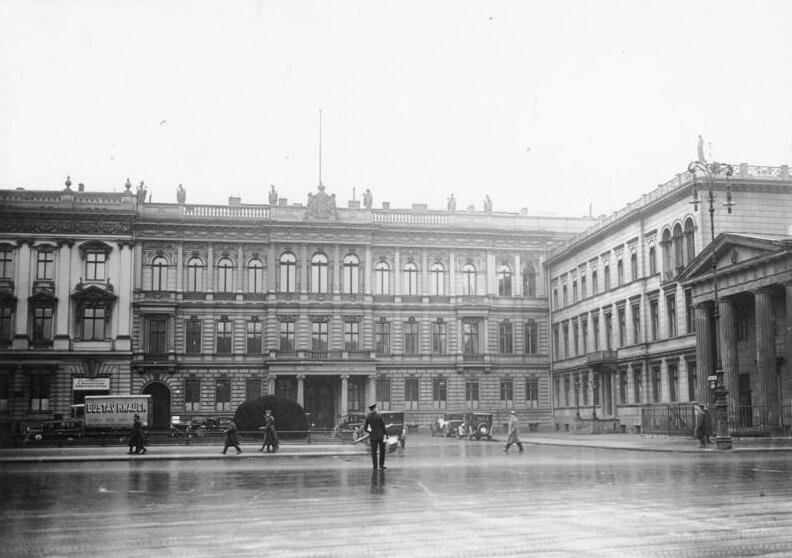
Another notable property was Raduň Castle in the Czech Republic, held by the family from 1832 to 1945. In Berlin, the Blücher-Palais near Brandenburg Gate served as a grand mansion for the family.
9.4. Cultural Impact
Blücher's impact on German culture is evident in a popular German saying, ran wie Blücher gehen (ran wie Blücher gehento charge like BlücherGerman), meaning someone is taking very direct and aggressive action, whether in war or other contexts. The full, though now obsolete, German saying relates to the Battle of the Katzbach in 1813: "ran wie Blücher an der Katzbach gehen" (ran wie Blücher an der Katzbach gehento advance like Blücher at KatzbachGerman), describing vigorous, forceful behavior.